Huawei Technologies DRH3985A Distributed Remote Head User Manual
Huawei Technologies Co.,Ltd Distributed Remote Head
Contents
- 1. User Manual
- 2. User Manual II
- 3. User Manual III
User Manual

DRH3917A&DRH3919A&DRH3919B&
DRH3985A
Hardware Maintenance Guide
Issue
Draft A
Date
2013-08-20
HUAWEI TECHNOLOGIES CO., LTD.

Issue ()
Huawei Proprietary and Confidential
Copyright © Huawei Technologies Co., Ltd.
i
Copyright © Huawei Technologies Co., Ltd. 2013. All rights reserved.
No part of this document may be reproduced or transmitted in any form or by any means without prior
written consent of Huawei Technologies Co., Ltd.
Trademarks and Permissions
and other Huawei trademarks are trademarks of Huawei Technologies Co., Ltd.
All other trademarks and trade names mentioned in this document are the property of their respective
holders.
Notice
The purchased products, services and features are stipulated by the contract made between Huawei and
the customer. All or part of the products, services and features described in this document may not be
within the purchase scope or the usage scope. Unless otherwise specified in the contract, all statements,
information, and recommendations in this document are provided "AS IS" without warranties, guarantees or
representations of any kind, either express or implied.
The information in this document is subject to change without notice. Every effort has been made in the
preparation of this document to ensure accuracy of the contents, but all statements, information, and
recommendations in this document do not constitute a warranty of any kind, express or implied.
Huawei Technologies Co., Ltd.
Address:
Huawei Industrial Base
Bantian, Longgang
Shenzhen 518129
People's Republic of China
Website:
http://www.huawei.com
Email:
support@huawei.com
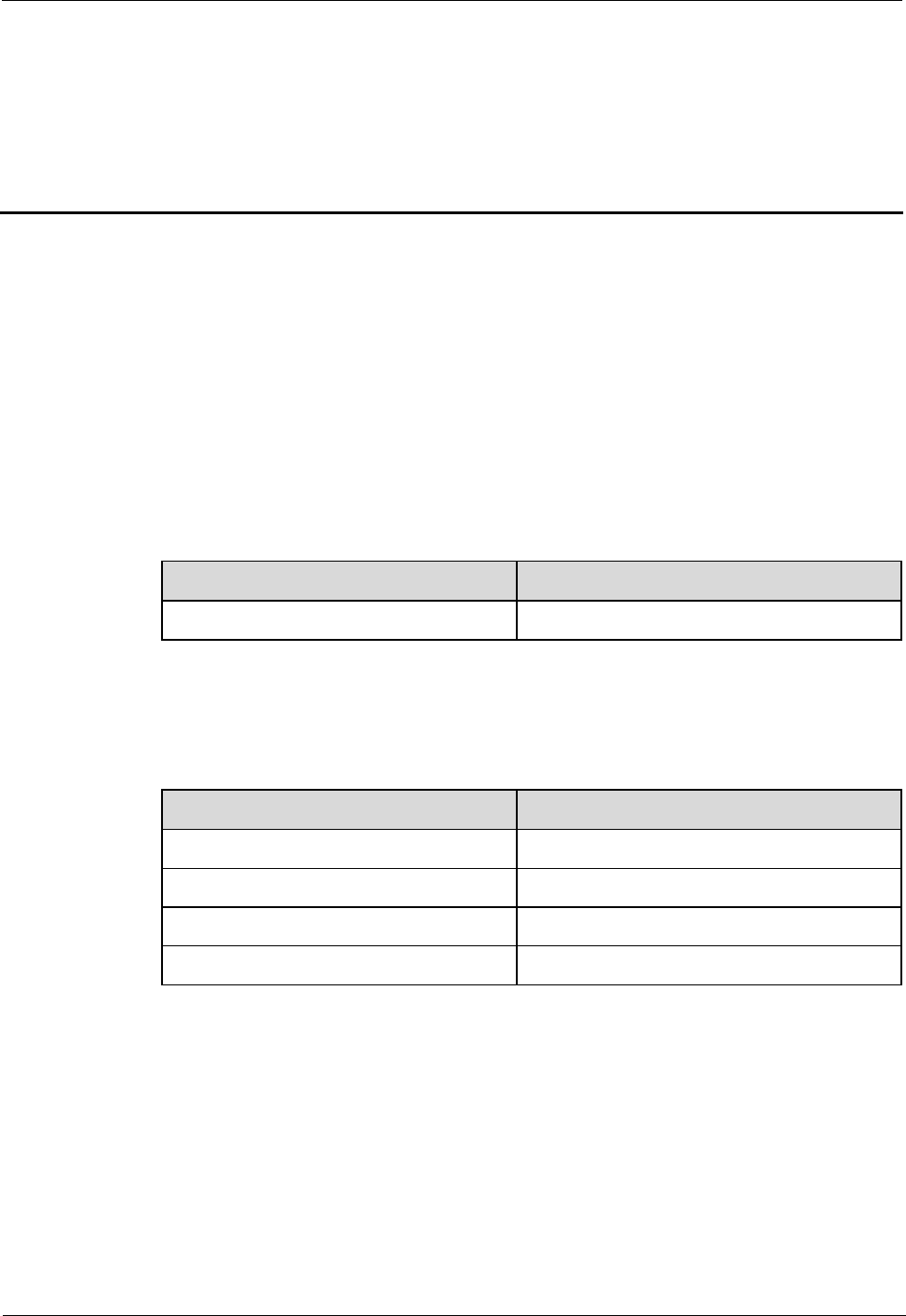
About This Document
Issue ()
Huawei Proprietary and Confidential
Copyright © Huawei Technologies Co., Ltd.
ii
About This Document
Purpose
This document describes routine maintenance procedures for a DRH (referred to as DRH in
this document), such as equipment preventive maintenance and power-on and power-off
operations. It also explains how to replace the DRH and optical modules.
Product Version
The following table lists the product version related to this document.
Product Name
Product Version
DBS3900 IBS
V100R001C02
Scope of application
The following table lists the product version related to this document.
DRH Name
DRH Version
DRH3917A
V100R001C02
DRH3919A
V100R001C02
DRH3919B
V100R001C02
DRH3985A
V100R001C02
Intended Audience
This document is intended for:
System engineers
Site maintenance engineers

About This Document
Issue ()
Huawei Proprietary and Confidential
Copyright © Huawei Technologies Co., Ltd.
iii
Organization
1 Changes in the DRH Hardware Maintenance Guide
This chapter describes the changes in the DRH Hardware Maintenance Guide.
2 Preventative Maintenance Items for a DRH
Preventative maintenance for a DRH improves the reliability of the DRH. You are advised to
perform scheduled maintenance yearly.
3 Powering On and Off a DRH
After a DRH is powered on, check the status of DRH indicators and voltage. Before the DRH
is powered off, follow the normal power-off or emergent power-off procedure as required.
4 Replacing a DRH
A distributed base station consists of DRHs and a DCU. Replacing a DRH interrupts all the
services carried by the DRH, and alarms are generated.
5 Replacing an Optical Module
An optical module implements optical-electrical conversion, enabling optical transmission
between a DRH and other devices. You must disconnect fiber optic cables from an optical
module before replacing the optical module. Disconnecting the fiber optic cables interrupts
the transmission of CPRI signals.

Contents
Issue ()
Huawei Proprietary and Confidential
Copyright © Huawei Technologies Co., Ltd.
iv
Contents
About This Document .................................................................................................................... ii
1 Changes in the DRH Hardware Maintenance Guide ............................................................ 1
2 Preventative Maintenance Items for a DRH ............................................................................ 2
3 Powering On and Off a DRH ..................................................................................................... 4
3.1 Powering On an DRH ................................................................................................................................................... 4
3.2 Powering Off a DRH .................................................................................................................................................... 5
4 Replacing a DRH ........................................................................................................................... 6
5 Replacing an Optical Module ..................................................................................................... 9

1 Changes in the DRH Hardware Maintenance Guide
Issue ()
Huawei Proprietary and Confidential
Copyright © Huawei Technologies Co., Ltd.
1
1 Changes in the DRH Hardware
Maintenance Guide
This chapter describes the changes in theDRH Hardware Maintenance Guide.
Issue Draft A (2013-08-20)
This is the Draft A version.
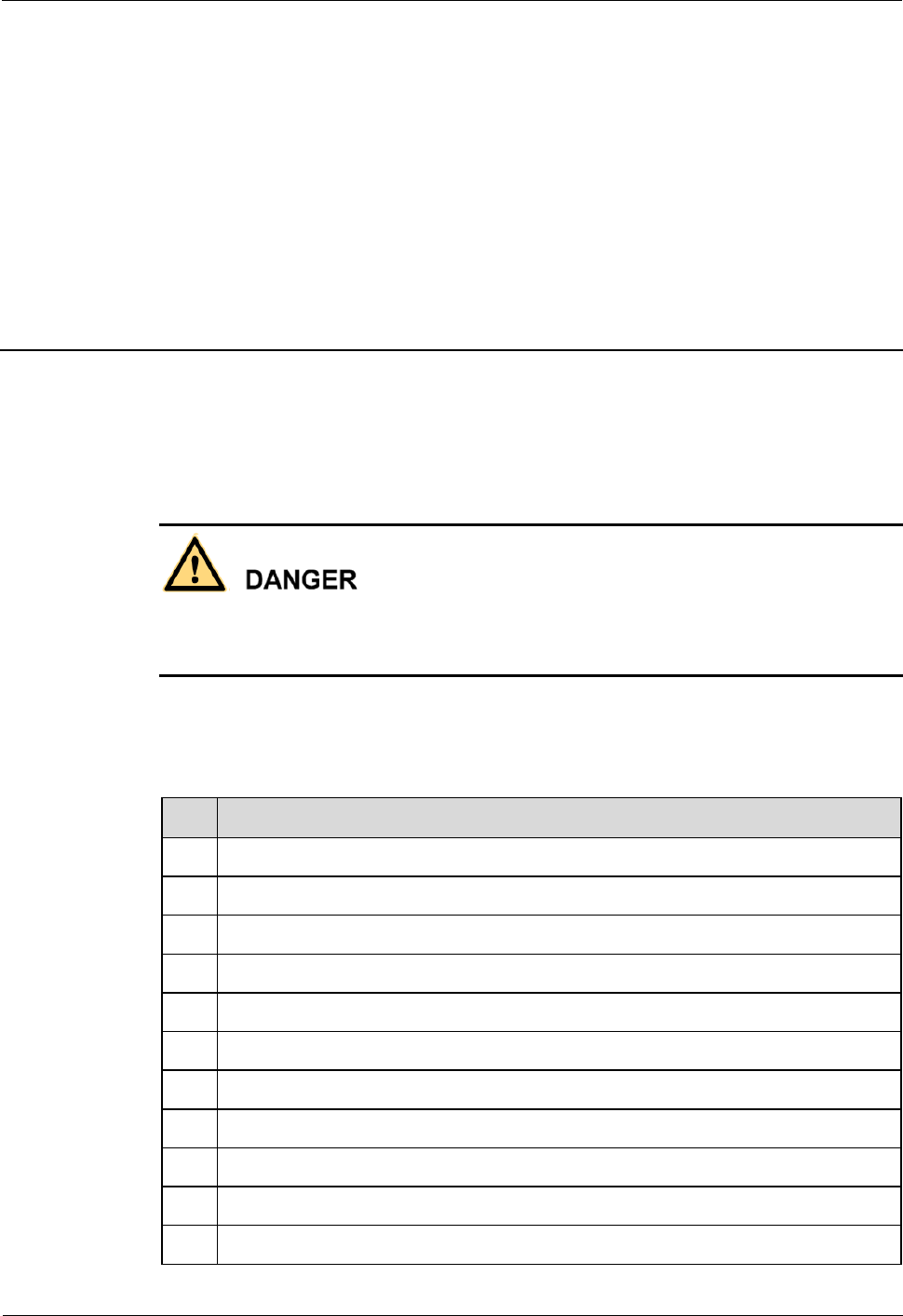
2 Preventative Maintenance Items for a DRH
Issue ()
Huawei Proprietary and Confidential
Copyright © Huawei Technologies Co., Ltd.
2
2 Preventative Maintenance Items for a
DRH
Preventative maintenance for a DRH improves the reliability of the DRH. You are advised to
perform scheduled maintenance yearly.
While working at heights, be careful not to drop any tools, equipment, or other objects.
Falling objects may cause serious injury or death. Always wear a helmet and avoid standing in
the danger area.
The items in the following checklist are not mandatory but strongly recommended. Table 2-1
lists the preventative maintenance items for a DRH.
Table 2-1 Preventative maintenance items for a DRH
SN
Item
1
All DRHs are properly installed and in good condition.
2
Cables are sealed properly at the entry points of the cabinet.
3
All RF cables are free from wear, cuts, cracks, or other damage.
4
All RF cable connectors are sealed properly.
5
All RF cable conduits are in good condition.
6
All power cables are free from wear, cuts, cracks, or other damage.
7
All power cable connectors are in good condition.
8
All power cable conduits are in good condition.
9
All shield layers of power cables are in good condition.
10
All power cables are sealed properly.
11
All CPRI fiber optic cables are free from wear, cuts, cracks, or other damage.

2 Preventative Maintenance Items for a DRH
Issue ()
Huawei Proprietary and Confidential
Copyright © Huawei Technologies Co., Ltd.
3
SN
Item
12
All screws are tightened on the cover plate of the cabling cavity.
13
All RET cables (optional) are free from wear, cuts, cracks, or other damage.
14
All RET cable (optional) connectors are sealed properly.
15
All alarm cables (optional) are installed and free from any damage.
If any of the statements in the checklist cannot be complied with, perform the following
corrective actions:
1. Tighten all connections.
2. Report any other faults found when filling in the checklist to the supervisor, because
only technically-qualified and trained field engineers are permitted to climb towers for
further repairs.
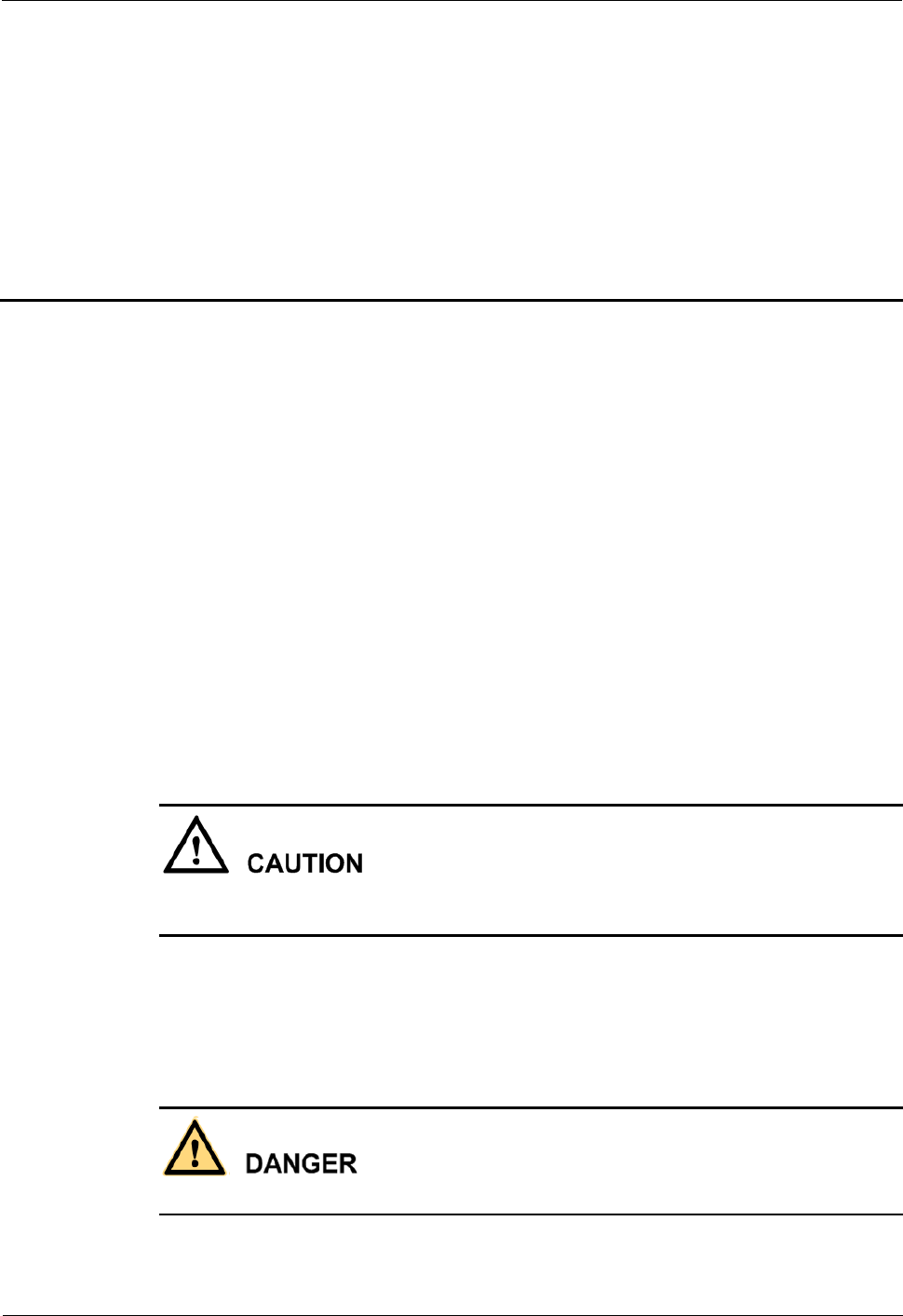
3 Powering On and Off a DRH
Issue ()
Huawei Proprietary and Confidential
Copyright © Huawei Technologies Co., Ltd.
4
3 Powering On and Off a DRH
After a DRH is powered on, check the status of DRH indicators and voltage. Before the DRH
is powered off, follow the normal power-off or emergent power-off procedure as required.
3.1 Powering On an DRH
Set the corresponding circuit breaker on the auxiliary power device for the DRH to ON, and
check the operating status of the DRH by observing the status of DRH indicators.
Prerequisites
The DRH hardware is installed and DRH cable connections are secure.
The input voltage of the DRH ranges from -36 V DC to -57 V DC.
Context
After you unpack a DRH, you must power on it within 24 hours. If you power off the DRH
for maintenance, you must restore power to the DRH within 24 hours.
Procedure
Step 1 Set the corresponding circuit breaker on the auxiliary power device for the DRH to ON to
power on the DRH.
Do not look into the optical module without eye protection after the DRH is powered on.
Step 2 Keep the DRH running for three to five minutes to check the status of DRH indicators. For
details, see DRH Indicators.
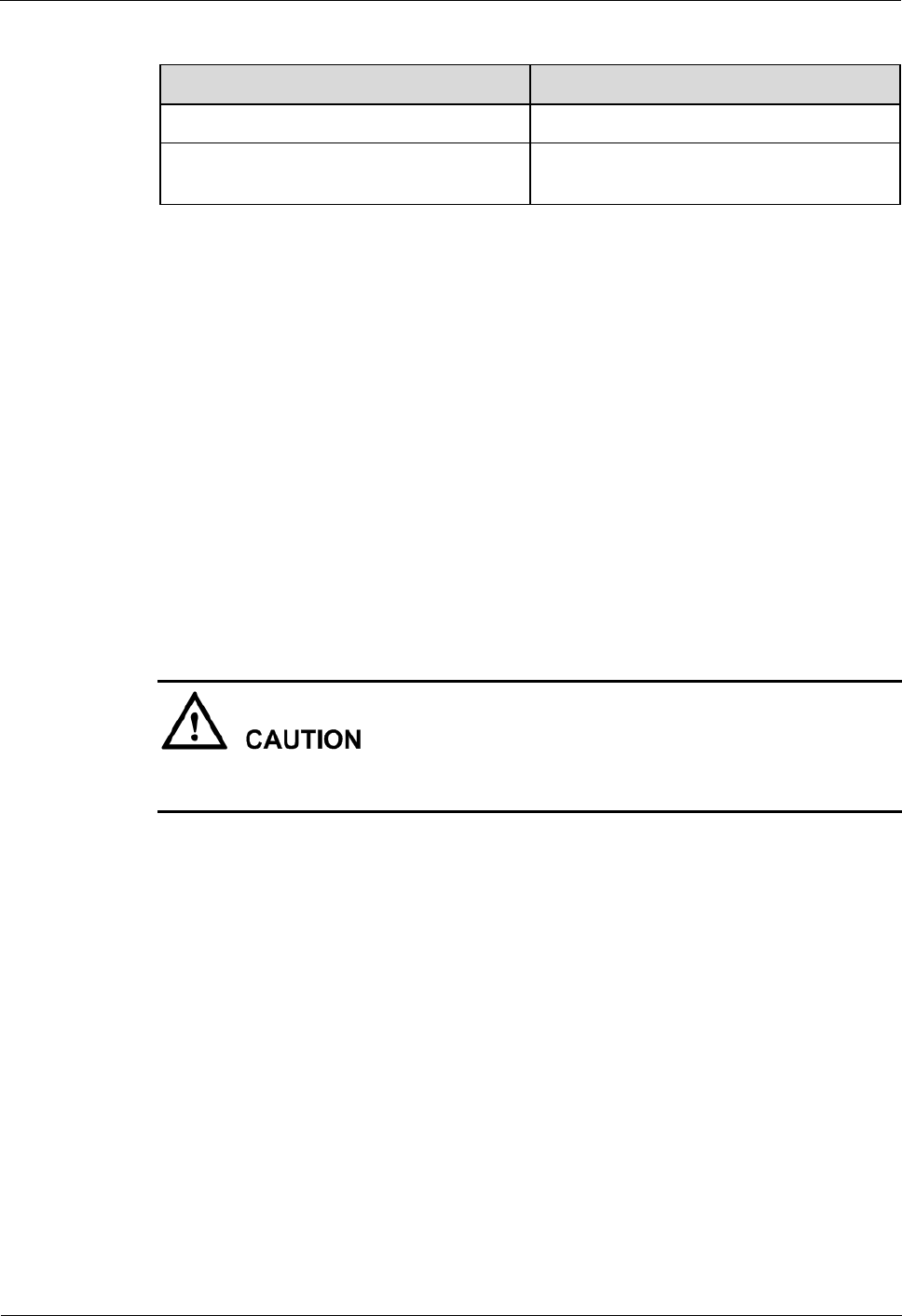
3 Powering On and Off a DRH
Issue ()
Huawei Proprietary and Confidential
Copyright © Huawei Technologies Co., Ltd.
5
Step 3 Take corresponding actions based on the status of the indicators.
If...
Then...
The DRH is working properly
End the power-on check task.
The DRH is faulty
Set the circuit breaker to OFF. Rectify the
fault, and then go to Step 1.
----End
3.2 Powering Off a DRH
A DRH can be powered off in two ways: normal power-off and emergency power-off. You
must power off a DRH in a normal situation such as moving the equipment or anticipating a
territorial blackout. You must also power off a DRH in an emergency such as a fire, smoke, or
water immersion occurs in the equipment room.
Procedure
Normal power-off
1. Set the corresponding circuit breaker on the auxiliary power device for the DRH to OFF.
Emergency power-off
Emergency power-off may damage the DRH. Therefore, this type of power-off is not
recommended in normal cases.
1. Shut off the external input power of the auxiliary power device for the DRH.
2. If time permits, set the corresponding circuit breaker on the auxiliary power device for
the DRH to OFF.
----End
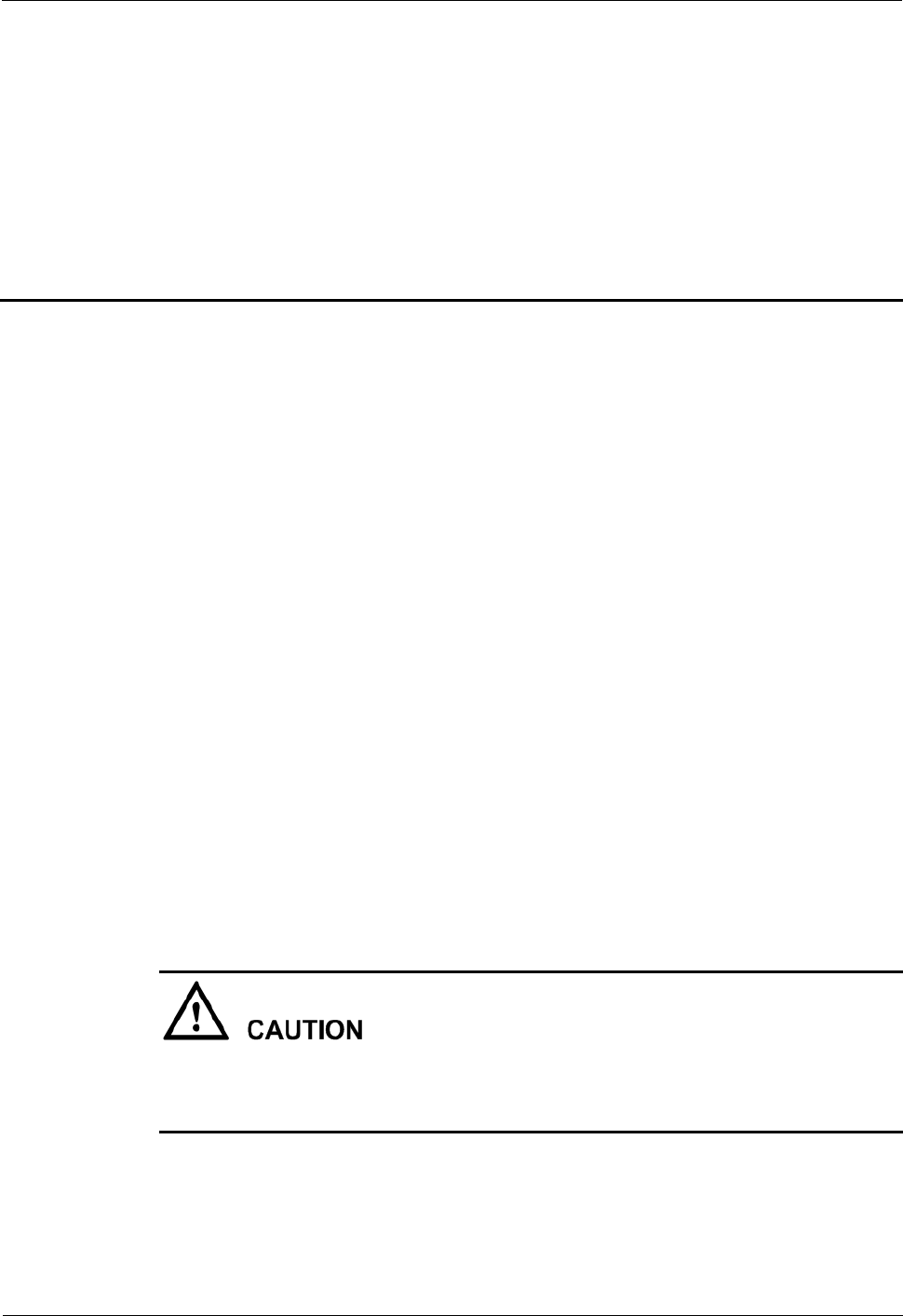
4 Replacing a DRH
Issue ()
Huawei Proprietary and Confidential
Copyright © Huawei Technologies Co., Ltd.
6
4 Replacing a DRH
This chapter describes the procedure and precautions for replacing a DRH.
Prerequisites
The WebLMT or M2000 communicates with the station properly.
The types of faulty DRHs are confirmed as follows:
− Log in to the WebLMT or M2000 and run the MML command to query the
manufacturing information of the DRHs. The types of DRHs to be replaced can be
determined according to the values of Type and Description in the command
execution result.
− Run the DSP BRDMFRINFO command.
Tools and materials, such as ESD gloves, M5 Phillips screwdrivers, M6 Phillips
screwdrivers, M6 inner hexagon torque wrench, waterproof tape, and PVC insulation
tape, are ready.
The number and type of DRHs to be replaced are confirmed, and new DRHs are ready.
Procedure
Step 1 Run the BLK BRD command to block the DRH.
Step 2 Power off the DRH by referring to 3.2 Powering Off a DRH.
Step 3 Wear ESD gloves.
Take proper ESD protection measures, for example, wear ESD gloves, to prevent
electrostatic damage to the boards, modules, or electronic components.
Pay attention to the high temperature while replacing a DRH without housing.
Step 4 Loosen the protection screw on the cover plate of the DRH cabling cavity using an M4
Phillips screwdriver, and then push the handle outwards to open the cover plate.
Step 5 Record all the cable connections on the panel of the module to be replaced.
Step 6 Disconnect cables from the cabling cavity and bottom panel.
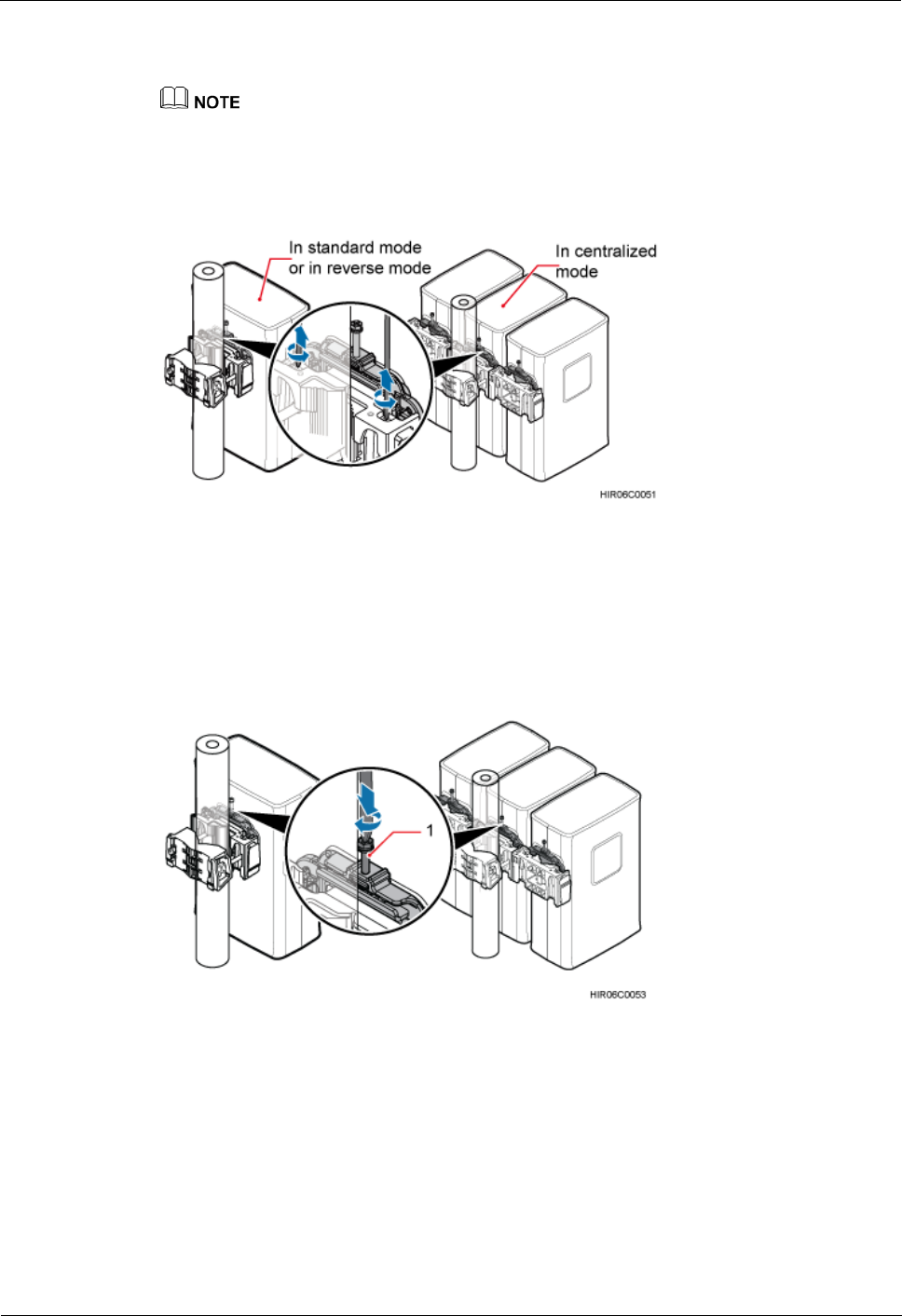
4 Replacing a DRH
Issue ()
Huawei Proprietary and Confidential
Copyright © Huawei Technologies Co., Ltd.
7
Step 7 Loosen the captive screws on the two hoist clamps on the main mounting bracket using an M4
Phillips screwdriver, as shown in Figure 4-1.
In scenarios where DRHs are installed in centralized mode, the DRH in the middle can be removed
without removing the two DRHs on its right and left sides, in the same procedure as that for removing a
single DRH.
Figure 4-1 Loosening captive screws on the main mounting bracket
Step 8 Tighten the screws on the attachment plate of the DRH using an M6 Phillips screwdriver, as
shown in Figure 4-2. Use the screw only for removing the DRH to loosen the connection
between the attachment plate and the main mounting bracket, and then support the DRH
bottom to remove it, as shown in Figure 4-3.
Figure 4-2 Tightening screws on the attachment plate
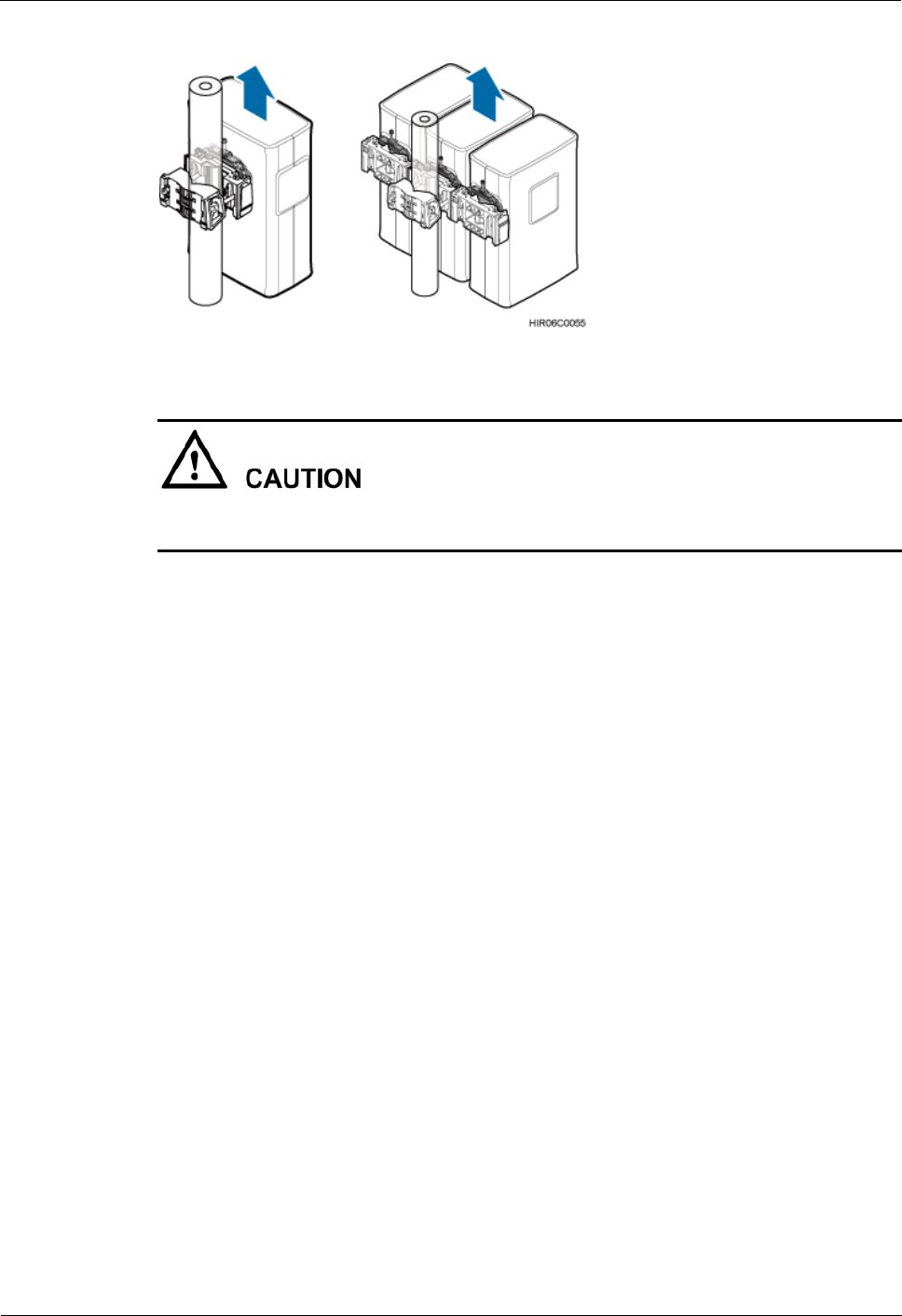
4 Replacing a DRH
Issue ()
Huawei Proprietary and Confidential
Copyright © Huawei Technologies Co., Ltd.
8
Figure 4-3 Supporting the DRH bottom
When removing the DRH, hold the DRH handle with one hand and support the DRH bottom
with the other hand.
Step 9 Tighten the captive screws on the two hoist clamps on the main mounting bracket to 1.4 N·m
(12.39 lbf·in.). Install a new DRH and then waterproof the DRH.
Step 10 Reconnect all required cables, and verify that vacant cable troughs in the cabling cavity are
equipped by waterproof blocks.
Step 11 Close the cover plate of the DRH cabling cavity, and then tighten the protection screw on the
cover plate to 0.8 N·m (7.08 lbf·in.).
Step 12 Power on the DRH by referring to 3.1 Powering On a DRH.
Step 13 Check the operating status of the new DRH by observing the status of DRH indicators. For
details about the status of the indicators, see DRH Indicators.
Step 14 Run the UBL BRD command to unblock the DRH.
Step 15 Take off the ESD gloves, and pack up all the tools.
----End
Follow-up Procedure
Place the removed DRH into the ESD box or bag. Then, place the ESD box or bag into a
foam-padded carton or the packing box of the new DRH.
Fill in the fault form with detailed information about the removed component.
Contact the local Huawei office to handle the faulty component.
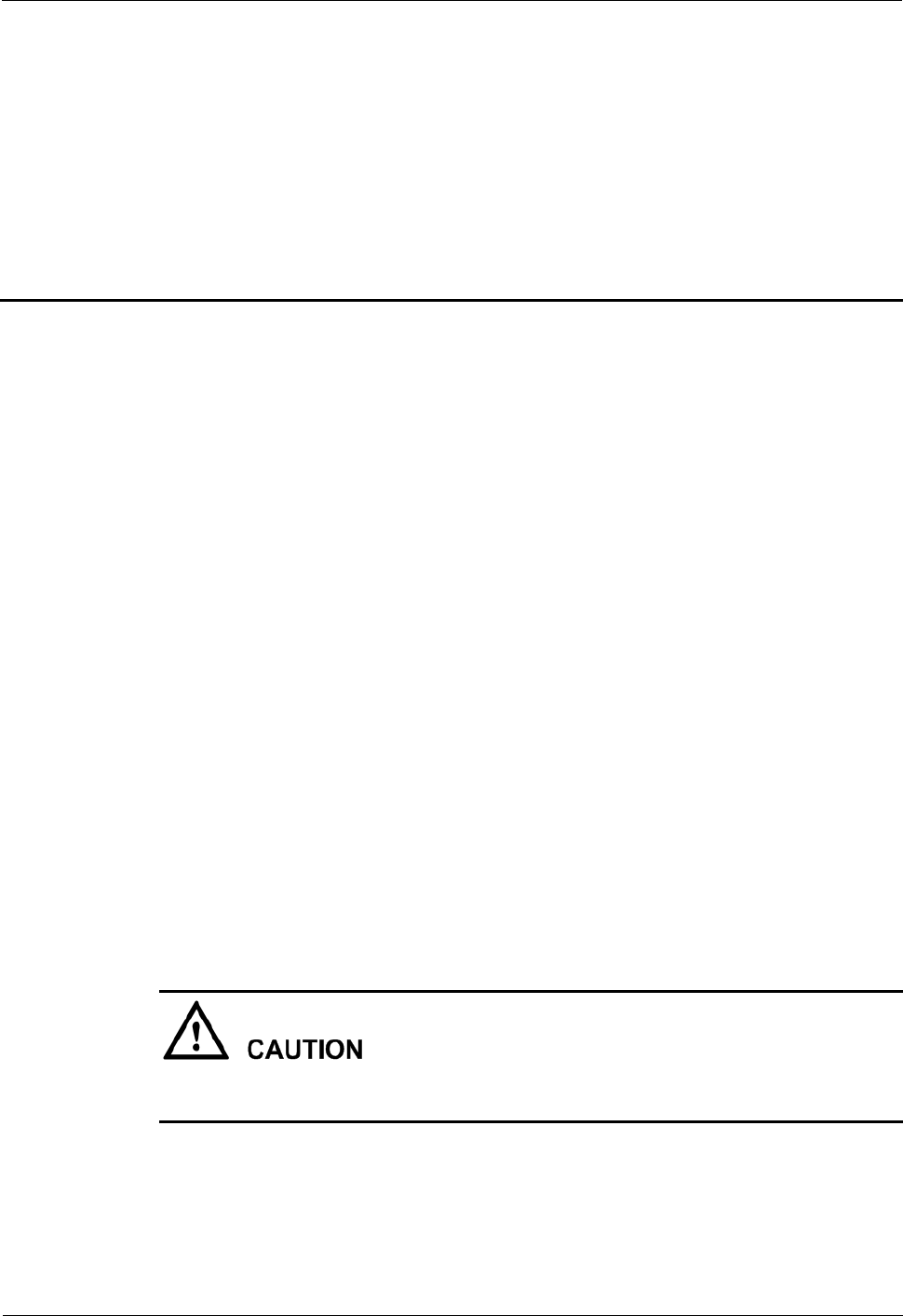
5 Replacing an Optical Module
Issue ()
Huawei Proprietary and Confidential
Copyright © Huawei Technologies Co., Ltd.
9
5 Replacing an Optical Module
An optical module implements optical-electrical conversion, enabling optical transmission
between a DRH and other devices. You must disconnect optical fibers from an optical module
before replacing the optical module. Disconnecting the optical fibers interrupts the
transmission of CPRI signals.
Prerequisites
The type and number of optical modules to be replaced are confirmed, and new optical
modules are ready.
Tools and materials, such as ESD gloves, M4 Phillips screwdrivers, and an ESD box or
bag, are ready.
Context
Optical modules are inserted into CPRI0 and CPRI1 ports on a DRH.
Optical modules are hot-swappable when the same CPRI ports are used.
It takes about five minutes to replace an optical module on the DRH, which involves
disconnecting fiber optic cables, removing the faulty optical module, inserting a new
optical module, reconnecting the fiber optic cables, and waiting for CPRI links to
resume.
Procedure
Step 1 Wear ESD gloves.
Take proper ESD protection measures, for example, wear ESD gloves, to prevent electrostatic
damage to the boards, modules, or electronic components.
Step 2 Loosen the protection screw on the cover plate of the DRH cabling cavity using an M4
Phillips screwdriver, and then push the handle outwards to open the cover plate.
Step 3 Record the connections of the optical module and fiber optic cables.
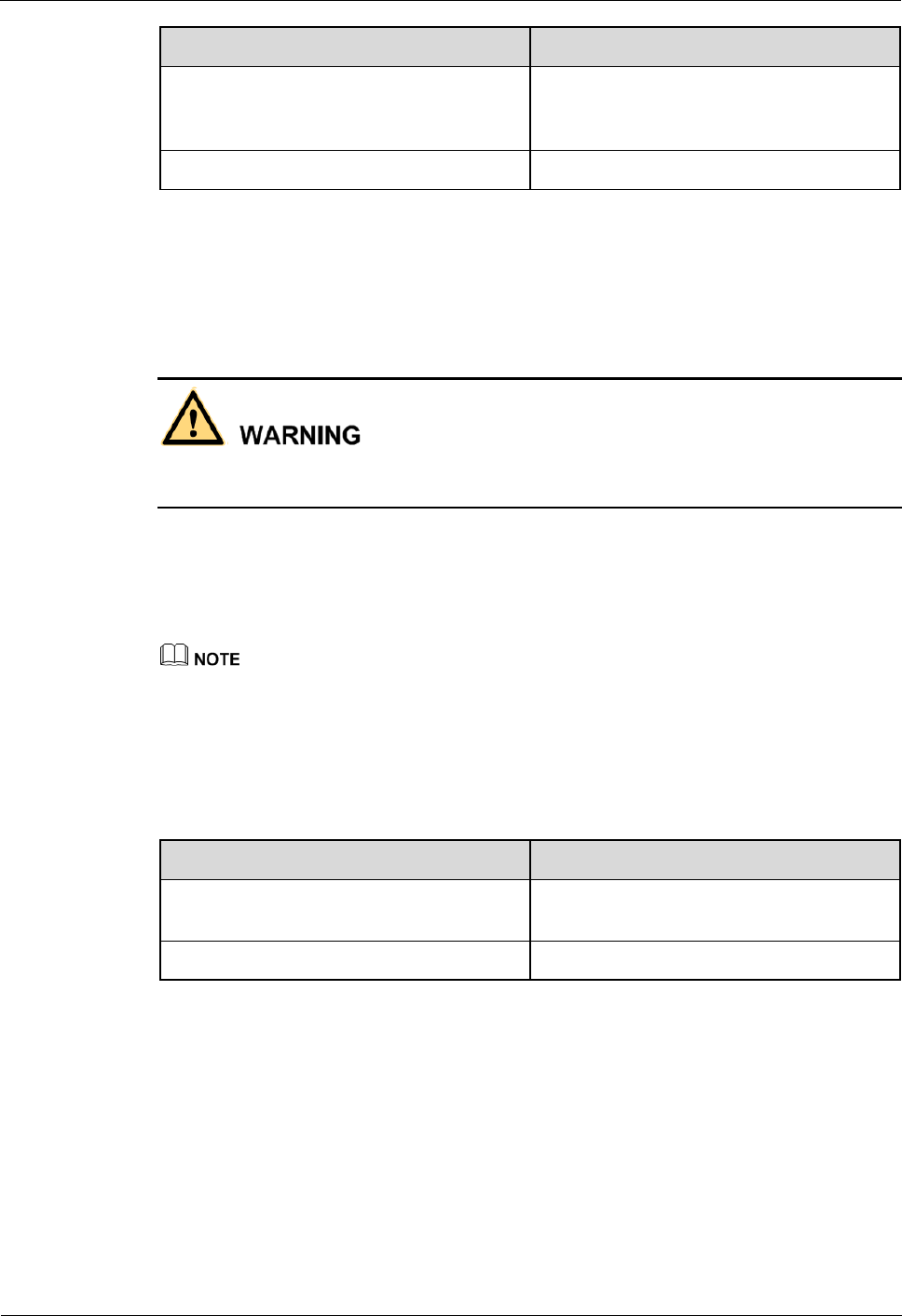
5 Replacing an Optical Module
Issue ()
Huawei Proprietary and Confidential
Copyright © Huawei Technologies Co., Ltd.
10
If...
Then...
The faulty optical module is inserted into
the CPRI0 port and cables are connected to
the DB15 port
Go to Step 4.
In other cases
Go to Step 5.
Step 4 Remove the DB15 connector.
Step 5 Press the latch on the fiber optic cable connector, and then remove the connector from the
faulty optical module.
Do not look into the fiber optic cable or optical module without eye protection after the fiber
optic cable is removed from the optical module.
Step 6 Lower the puller on the faulty optical module, and then pull the puller until the optical module
is removed from the DRH.
Step 7 Choose the optical module of the same type as the faulty optical module according to the label
on the module. Install a new optical module into the DRH.
The optical modules to be installed must match CPRI rates.
Step 8 Insert the fiber optic cable connector into the new optical module.
Step 9 Check the transmission of CPRI signals by observing the status of CPRI0/IR0 and CPRI1/IR1
indicators. For details about the status of the indicators, see DRH Indicators.
Step 10 Reconnect the cables in the cabling cavity.
If...
Then...
Cables are disconnected from the DB15 port
previously
Go to Step 11.
In other cases
Go to Step 12.
Step 11 Insert the DB15 connector.
Step 12 Close the cover plate of the DRH cabling cavity, and then tighten the protection screw on the
cover plate to 0.8 N·m (7.08 lbf·in.).
Step 13 Take off the ESD gloves, and pack up all the tools.
----End

5 Replacing an Optical Module
Issue ()
Huawei Proprietary and Confidential
Copyright © Huawei Technologies Co., Ltd.
11
Follow-up Procedure
Place the removed optical module into the ESD box or bag. Then, place the ESD box or
bag into a foam-padded carton or the packing box of the new module.
Fill in the fault form with detailed information about the removed component.
Contact the local Huawei office to handle the faulty optical module.